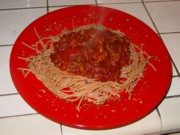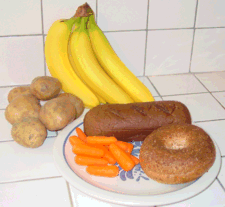Nutrition is critical while training for a marathon or half marathon. Carbs, carbs, carbs! If you are on a low carb diet, then STOP. Carbohydrates provide the fuel for runners. Load up!
 Carbohydrates will provide glycogen and protein will help repair muscle tissue. Men and women need to consume 2000-2500 calories each day. During training, you will need to add 100 calories per mile you will be running (or try the Caloric Needs Calculator). 65% of your calories should come from carbohydrates, particularly complex carbohydrates. 10% should come from protein (you need 0.5 to .07 grams per pound of your body weight each day). 20-25% of your total calories should come from unsaturated fats.
Carbohydrates will provide glycogen and protein will help repair muscle tissue. Men and women need to consume 2000-2500 calories each day. During training, you will need to add 100 calories per mile you will be running (or try the Caloric Needs Calculator). 65% of your calories should come from carbohydrates, particularly complex carbohydrates. 10% should come from protein (you need 0.5 to .07 grams per pound of your body weight each day). 20-25% of your total calories should come from unsaturated fats.Vitamins are highly recommended and will give you adequate supplies of the minerals your body needs. Take multi-vitamins daily as a supplement. Also, keep in mind you need plenty of calcium and iron. See the nutritional charts for the things you eat and make sure you are getting adequate amounts of both. Stay away from pizza!
 Following are good sources of complex carbohydrates and protein:
Following are good sources of complex carbohydrates and protein:Good Carbohydrates:
Potatoes, yams, beans, peas, wheat bread, bananas, macaroni, spaghetti, cereal, raisins, apples, bagels, syrup, brown rice, corn, apples, carrots, root vegetables
Good Protein:
Low fat milk, beans, green peas, lean beef, chicken, fish, eggs, cheese, yogurt, nuts, peanut butter, cottage cheese, tofu and soy products
What to Eat and When
In addition to daily nutrition requirements, eating the right food at the right time is essential for maintaining energy during the run and for maximum post-run recovery.
While running, your body depends on glycogen and fat as sources of fuel (primarily glycogen). By increasing carbohydrate consumption in daily meals, you increase your glycogen storage – thus, adding fuel to your tank. While running, you begin to deplete glycogen storage. The longer the run, the more depleted your glycogen storage becomes until it would eventually run out if not replenished. When glycogen runs out, your body transitions to burn only fat. This transition stage is commonly referred to as "the wall". Eating before, during, and after a run will help you maintain adequate glycogen.
When eating before a run, it is best to have a light snack (such as a banana and wheat bagel) an hour before the run. Whatever you choose to eat, it should be something that your body digests well.
Within 30-minutes after each run, always feed your body after a run with carbohydrates and protein to help your body recover and be strong for the next run.
No comments:
Post a Comment